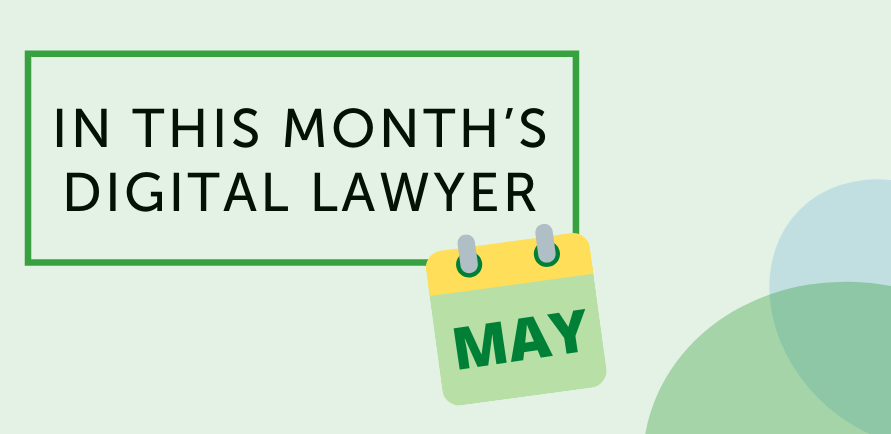Industry news on legal tech, digital transformation & innovation in law and professional growth.
In this month’s Digital Lawyer:
Digital transformation and innovation in law
#1
One of the stereotypes regarding legal technology is that once implemented it will reduce lawyers’ profits. The Australia-based NewLawCLE conducted a survey that showed that the use of fixed price legal services combined with document automation, can make more money for lawyers, not less, especially with matters perceived to be ‘complex’. “Clients really only care about the finished product, and for the law firm, clearly charging $1,000 for a service that took two hours to complete is better than charging the same amount for a service that took 10 hours to complete.”
#2
Some legal teams are already coming back to the offices, but the majority are still working from home. Distributed legal project teams have to be managed effectively and Antony Smith offers his tips on project planning meetings, electronic communication and critical tasks.
Legal tech industry news
#3
More and more legal teams get disappointed with legal tech tools implementation and results tech vendors fail to bring: product roadmaps are overpromised, deadlines are postponed, processes are not moving. Irene Liu, General Counsel, and Neta Hamou, Director of Commercial Legal Affairs, at Checkr shared their heart-breaking love story that taught them how to build relations with legal tech vendors and achieve success with a tool: asking for peer recommendations, defining must-have versus nice-to-have requirements, utilizing the scorecard to evaluate potential tools and building project timeline.
#4
IACCM Future of contracting Survey showed that only 1 of 10 agreed that contracts are “easy to understand”. Incomprehensible contracts provoke more risks and fail to meet clients’ expectations on lawyers’ services. Kristian Foss, Attorney-at-law and a partner in Bull & Co Law firm suggests user-friendly methods to make complex agreements easy-to-understand, faster to draft and flexible to change.
Professional growth and personal productivity
#5
Critical thinking is №1 workplace skill and especially relevant for lawyers who have to analyse arguments logically, make objective evaluation of facts, solve problems and make decisions.
This article describes the RED Model Recognise Assumptions, Evaluate Arguments, Draw Conclusions) as a method for lawyers to evaluate and apply critical thinking principles when faced with a decision. “Critical thinking can help loosen mental strings and assist lawyers in seeing across various disciplines and beyond cultural barriers.”
#6
The article urges to quit measuring productivity by hours a worker spends at a designated workstation since “hours are a relic of the past that might have been appropriate for assembly line work, but in a knowledge economy it doesn’t make any sense… Redefining how you measure productivity can be a daunting task, but maintaining the status quo is often more difficult in the face of today’s remote working reality.”
On a mission to constantly deliver operational intelligence to our customers, each month we publish a carefully curated list of news we find important.
Focused on legal tech, digital transformation & innovation in law and professional growth, the Digital Lawyer newsletter includes the month’s most notable updates in the market.

